NT estimates: Selena Uibo says 10-year agreement should shift conversation on remote housing design
The Remote Housing Minister admitted efforts to develop more culturally appropriate builds had been vetoed in order to meet funding deadlines.
Politics
Don't miss out on the headlines from Politics. Followed categories will be added to My News.
The Northern Territory government says it did not have time to design more culturally or environmentally appropriate homes for remote communities under previous funding agreements.
Minister Selena Uibo fronted the estimates committee on the third day of hearings on Thursday, questioned over her portfolios for public employment, and remote housing.
Asked why all homes in remote communities looked the same when design problems were well known, Ms Uibo admitted taking time to develop more suitable builds had been vetoed in order to meet funding deadlines.
“Under the outgoing five-year agreement we didn’t have the ability to look at change of design, we had to hit a milestone – if we don’t (we won’t) get the money from the federal government,” she said.
Ms Uibo said she hoped the recent $4bn 10-year housing agreement would allow for the conversation about design to shift, to allow for more “culturally appropriate, energy efficient, and climate change appropriate” homes.
The committee also heard all new builds would include a hot water tap for washing machines, unlike some previous homes which had cold taps only.
It was hoped better washing facilities would help bring down high rates of scabies in remote communities.
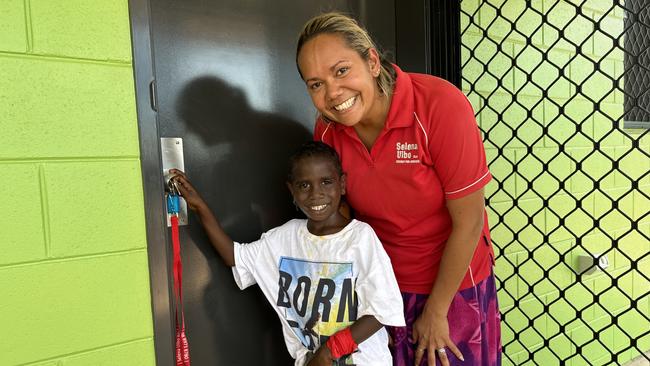
Estimates heard there are currently 22,220 public servants in the NT, up by 180 from last year.
Staff turnover was down to 10.8 per cent, from 12.17 per cent.
The opposition asked how many grievances had been raised in relation to the Territory’s special measures recruitment initiative to give preference to Aboriginal candidates.
Office of the Commissioner for Public Employment director Rachael Dunn told parliament there had been a “very limited number” of grievances raised, and those were largely about process rather than candidates.
Mulka MLA Yingiya Mark Guyula asked what Aboriginal language training was provided to public servants, given “a very large language deficit across the NT”.
Ms Uibo said there was no policy to improve public service skills in First Nations languages, however her department was working to offer a bonus to staff with existing language skills.
She said an accreditation process would recognise bilingual workers and compensate them for those skills.
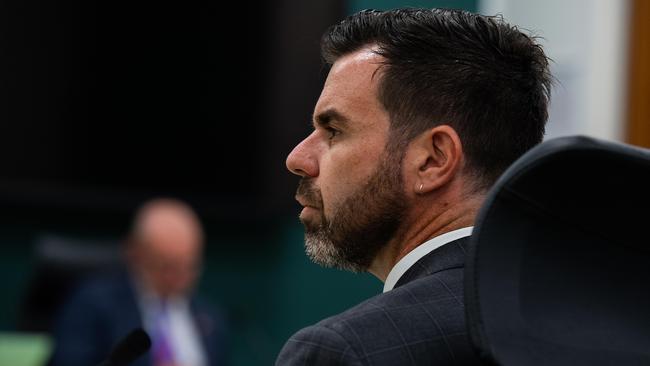
Crime, fireworks bungle under microscope as Paech fronts estimates
June 12: More than 100 victims of crime applications lodged on or before 2018 are yet to be processed, estimates have revealed.
Deputy Chief Minister Chansey Paech faced estimates hearings on Wednesday, fronting questions about topics including crime, NAAJA, treaty, and the controversial move of Territory Day fireworks from Mindil Beach.
Mr Paech, along with senior bureaucrats in his departments, told the committee 117 victims of crime applications were outstanding at least six years after being lodged, with an average wait time of three years and 10 months for claims to be processed.
In comparison 75 applications were received by the unit between July 2023 and March this year.
A range of resourcing issues were blamed for the long wait times, but it was noted an influx of new staff to the unit were expected to help improve outcomes.

Asked about the Territory Day fireworks being moved from Mindil Beach, Mr Paech said the decision rested entirely with NT Major Events, and the granting of Aboriginal Areas Protection Authority certificates could not be rushed to ensure one was secured ahead of the July 1 celebration.
He said the certificates were a voluntary risk management tool, granting immunity from prosecution if a sacred site was damaged.
“We’ve simply said that if Major Events were to host the fireworks at Mindil, they would be taking on the liability if anything were damaged,” Mr Paech said.
Estimates heard no complaint about the iconic fireworks display had been made by Larrakia traditional owners, nor had Major Events ever sought an authority certificate in years past.
Major Events is set to face estimates next week.
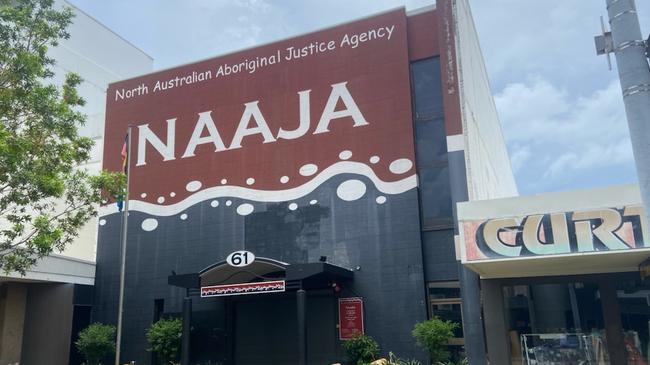
Hearings also revealed that NAAJA is fighting the government’s attempt to recall $2.69m in unspent funding.
Chief executive of the Attorney-General and Justice Department Gemma Lake told the Legislative Assembly attempts to recover the money had dragged on since February as NAAJA disputed the amount.
Territory and federal governments appointed an auditor to examine the legal service’s finances and compliance in January, after it stopped taking new criminal cases for a period of almost five months, from November 14 to April 1.
Ms Lake said she expected the disputed amount to be settled in the auditor’s report, and confirmed $532,723 had been withheld from NAAJA as a result of its service crisis.
Asked about a treaty between Indigenous and non-Indigenous Territorians, Mr Paech said $1.65m had been allocated in this year’s budget for “important conversations and education”.
“We are continuing to work through all the recommendations in the treaty report,” he said.
“This is an important journey for the Territory.”
Mulka MLA Yingiya Mark Guyula said treaty should be developed by an independent body, rather than a government department, arguing the “fight is between the government and the people”.
Chief Minister ‘annoyed’ at conversations about racism
11 June: Chief Minister Eva Lawler says she does not “want to continue to have conversations” about racism, arguing it incites division in the Northern Territory.
Her comments came in response to questions raised during a senate estimates hearing about Police Minister Brent Potter’s role responding to allegations of racism in the force, given his own history of sharing racist, misogynistic and homophobic social media posts.
Opposition Leader Lia Finocchiaro and Araluen MLA Robyn Lambley said it was “hypocritical” for Mr Potter to remain as police minister as he had been held to “a lower standard” than that being applied to NT Police officers.
Ms Lawler said she wholeheartedly supported Mr Potter’s work in the portfolio, and believed both he and members of the Territory Response Group, the unit responsible for handing out racist awards, had changed.
“I absolutely find racism abhorrent of any sort and absolutely value our multicultural population in the Northern Territory,” she told parliament.
“It does annoy me, these conversations around racism because I think it grows distrust and a wedge between our population, instead of trying to mend it.
“I think it breaks down (our) population, so I don’t want to continue to have conversations around racism, I think all it does is cause inflammation and concerns for me in the Northern Territory.”
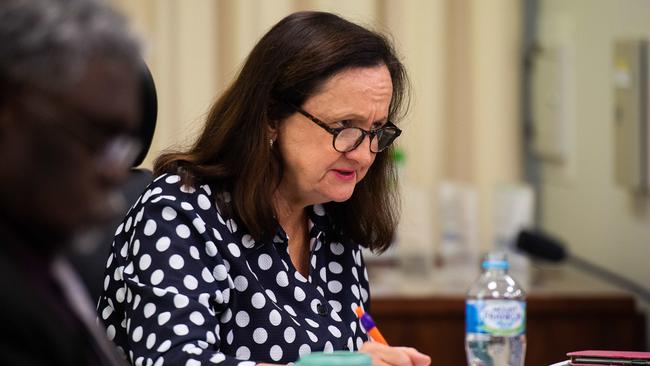
Last week the peak body representing Aboriginal organisations in the NT called for Ms Lawler, along with Mr Potter and Police Commissioner Michael Murphy, to apologise for denying systemic racism in the force, arguing denial was “in and of itself, racism”.
Ms Lambley told Ms Lawler: “You can’t pretend it’s not there, because people are calling on you to apologise”.
“Think about the Aboriginal people in this room, how do you think they feel about you defending the indefensible and talking about these things as if they’re past tense,” she said.
“There were Facebook posts put out by your Police Minister as recently as 2019.
“At least apologise to the Aboriginal people who are deeply offended by your police minister and by your police commissioner, because if you don’t, the culture within that government agency will never change – fish rots from the head down.”
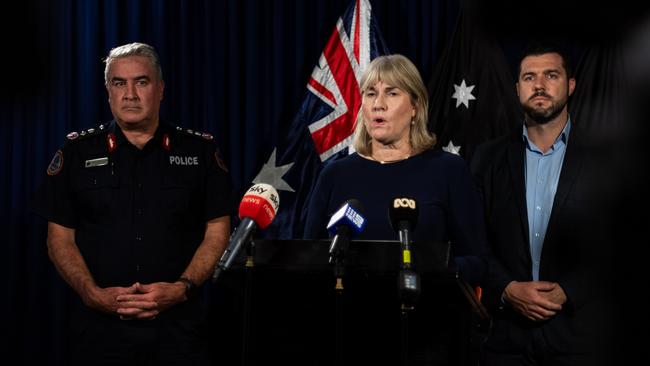
Ms Lawler said her government had accepted recommendations made in the Kelly review aimed at improving police culture.
She said she believed today’s police force was “very different” to that of the past, and she would continue to look forward to “make sure that our police force into the future isn’t racist”.
‘Tumultuous’ ICAC under scrutiny by estimates committee
June 11: The Chief Minister has defended her response to the anti-corruption watchdog’s investigation into Territory Labor’s use of taxpayer funds during the 2020 election campaign.
Two weeks of estimates hearings began in the NT Legislative Assembly on Tuesday, with Eva Lawler the first to be grilled over her portfolios, including that of the Office of the Independent Commissioner Against Corruption.
Independent MLA Robyn Lambley said Labor had a “moral and ethical responsibility” to pay back the thousands in public funds spent by former Chief Minister Michael Gunner’s government flying to remote communities when mobile polling stations were open at the last election.

Ms Lawler said the funds would not be paid back because the ICAC made no adverse findings against Mr Gunner.
“The findings were that the guidelines are unclear,” she told the estimates committee.
“It is confusing when you see Albo and Peter Dutton flying around in government planes during the election campaign … federal politicians all travel during caretaker period.”
Ms Lawler said she had updated the NT guidelines to provide clarity and there would be no government travel during the caretaker period, except for emergencies.
ICAC’s investigation looked at three trips estimated to be worth $14,100, however the limited scope of investigation means the true cost to taxpayers was likely much higher.
Northern Territory electoral commissioner Kirsten Kelly said there was no requirement for Labor to declare the funds spent on travel and accommodation as such expenses were generally not considered electoral expenses.

The separate scandal engulfing the ICAC itself also came under scrutiny, with Naomi Loudon fronting estimates just hours after being sworn in as acting commissioner.
A report on Monday cleared commissioner Michael Riches of allegations he paid his ex-wife to suppress domestic violence allegations.
Ms Louden said it had been a “tumultuous” fortnight for the office, and she hoped to provide the leadership it needed while Mr Riches remained on indefinite sick leave.
Ms Lawler said a summary of the report prepared by the ICAC Inspector would be tabled to parliament on the last day of estimates, June 20, even if she received it at an earlier date.
Questions about ICAC resourcing were taken on notice.
Recent budget papers revealed the office failed to meet key performance indicators, completing just 21 per cent of investigations within six months against a target of 60 per cent.
Over the 12 month reporting period 42 per cent of investigations were completed, compared with the minimum target of 75 per cent.
Each minister will be questioned on their portfolios as estimates continues over the fortnight.
Power and Water, Jacana Energy, and Territory Generations will also front the committee next Thursday.





